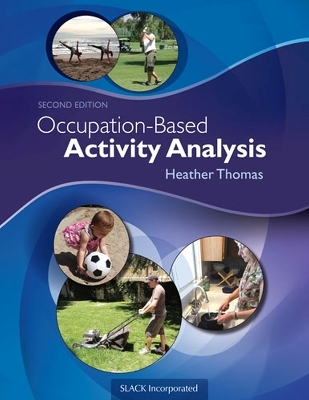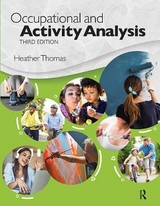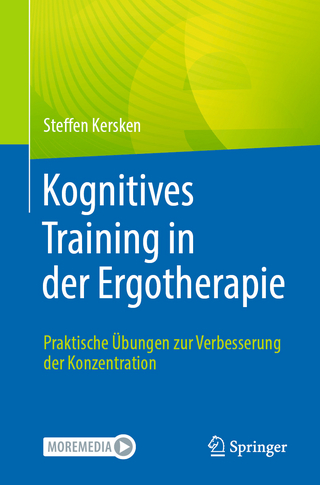
Occupation-Based Activity Analysis
SLACK Incorporated (Verlag)
978-1-61711-967-5 (ISBN)
- Titel erscheint in neuer Auflage
- Artikel merken
The new Second Edition of Occupation-Based Activity Analysis continues the tradition of teaching students and clinicians the process of conducting activity analyses and occupation-based activity analyses.
Dr. Heather Thomas has updated Occupation-Based Activity Analysis, Second Edition to reflect the significant changes made to the activity analysis process and terminology in the Occupational Therapy Practice Framework, Third Edition. As in an activity analysis, occupation-based activity analysis looks at what is required for full participation, yet goes beyond analyzing the activity; it looks at what it means for the person engaging in it and how and where it is performed by that person.
Inside Occupation-Based Activity Analysis, Second Edition, each chapter is dedicated to a component of the activity analysis process and corresponding section of the Framework. Chapters have been restructured based on a greater emphasis on occupation-based activity analysis. From start to finish, readers are guided through identifying the occupation, sequence and timing, objects and properties, space and social demands, body functions, and structures and performance skills required.
New in the Second Edition:
Chapters throughout the text have been updated to reflect the changes in the Framework
A new chapter to reflect the new addition to the Activity Demands section of the Framework
Changes in terminology and definitions in the areas of occupation, performance skills, and body functions
Additional activities provided at the end of each chapter
Appendices and forms have been updated to reflect the changes in the Framework
Images have been updated with greater clarity and resolution
Updated and new instructor materials for faculty to use in the classroom
Instructors in educational settings can visit www.efacultylounge.com for additional materials to be used for teaching in the classroom.
As a foundational skill, activity analysis and occupation-based activity analysis is utilized throughout students’ careers and into their lives as practitioners, making Occupation-Based Activity Analysis, Second Edition the perfect textbook for the occupational therapy or occupational therapy assistant student, faculty, or clinician.
Heather Thomas, PhD, OTR/L is an associate professor at West Coast University in Los Angeles, California. She began teaching activity analysis in 2004 at Loma Linda University. After obtaining her master’s degree in occupational therapy from the University of Southern California in 1998, she studied health care administration at Touro University International in Cypress, California, and gained her PhD in health science in 2011. Thomas’s clinical work focuses on the adult acute and acute rehabilitation settings. From 2000 to 2002, she was director of the Casa Colina Assistive Technology Center, and from 2007 to 2008, she served as director of Occupational Therapy Services at Casa Colina Centers for Rehabilitation in Pomona, California. She has served in multiple leadership roles within the Occupational Therapy Association of California and has presented at conferences of the American Occupational Therapy Association (AOTA). She currently serves as the California representative on the AOTA Representative Assembly. She has also served several terms as the chair of the Los Angeles Occupational Therapy Leadership Forum. Expanding occupational therapy’s reach into underserved areas, she has volunteered in Haiti to work with those who were injured during the earthquake of 2010 and then helped develop a rehabilitation technician program in that country. A yoga instructor for many years, she now enjoys practicing yoga at home in Los Angeles, snow skiing, gardening, teaching, and learning new occupations.
Dedication
Acknowledgments
About the Author
Introduction
Chapter 1 What Is Activity Analysis?
Chapter 2 Step 1: Determine What Is Being Analyzed
Chapter 3 Step 2: Determine the Relevance and Importance to the Client: Occupation-Based Activity Analysis
Chapter 4 Step 3: Determine the Sequence and Timing
Chapter 5 Step 4: Determine Object, Space, and Social Demands
Chapter 6 Step 5: Determine Required Body Functions
Chapter 7 Step 6: Determine Required Body Structures
Chapter 8 Step 7: Determine Required Actions and Performance Skills
Chapter 9 Activity Analysis for Evaluation, Intervention Planning, and Outcomes
Appendix A Activity Analysis Form
Appendix B Occupation-Based Activity Analysis Form
Appendix C Completed Activity Analysis Form
Index
| Erscheint lt. Verlag | 30.6.2015 |
|---|---|
| Sprache | englisch |
| Maße | 216 x 279 mm |
| Gewicht | 816 g |
| Themenwelt | Medizin / Pharmazie ► Physiotherapie / Ergotherapie ► Ergotherapie |
| ISBN-10 | 1-61711-967-9 / 1617119679 |
| ISBN-13 | 978-1-61711-967-5 / 9781617119675 |
| Zustand | Neuware |
| Informationen gemäß Produktsicherheitsverordnung (GPSR) | |
| Haben Sie eine Frage zum Produkt? |
aus dem Bereich



